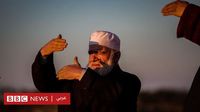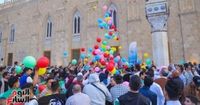As the crescent moon of Shawwal was sought after on the evening of March 29, 2025, Muslims around the globe eagerly anticipated the announcement of Eid al-Fitr. This annual tradition marks the end of Ramadan and is celebrated with joy and unity among communities. However, this year, the excitement was accompanied by confusion and debate over the exact date of the holiday, as some countries announced Sunday, March 30, as the first day of Eid, while others declared it to be Monday, March 31.
The variance in Eid announcements stemmed from differing practices regarding the sighting of the moon. Some nations rely on astronomical calculations, while others adhere strictly to traditional sighting methods. This divergence not only led to varying dates but also ignited discussions on social media platforms, where users expressed their opinions and frustrations.
In the Middle East, countries such as Saudi Arabia, the UAE, Qatar, Kuwait, Bahrain, Yemen, Palestine, and Lebanon confirmed that Sunday would be the first day of Eid. Conversely, Egypt, Oman, Jordan, Tunisia, Libya, and Algeria announced that Sunday would complete the month of Ramadan, with Eid commencing on Monday. Sabaa al-Hajaya from Jordan expressed pride in her country's position, stating, "In every position, Jordan appears on the right side with right, knowledge, and religion despite the challenges." This sentiment echoed the desire for unity among Muslims during this significant time.
Despite the joyous occasion, humor permeated many social media discussions, particularly regarding the discrepancies in Eid dates across Arab nations. While some users expressed their well-wishes for those celebrating on Sunday, others voiced their disbelief at the confusion. For instance, one user from Saudi Arabia, Hussam Saber, shared a heartfelt message wishing that this Eid would be a "beginning of lasting relief and unending hope" for those facing hardships.
However, the situation was not without its challenges. In Iraq, the Sunni Endowment Bureau initially announced that Sunday would be Eid, only to retract that statement later, confirming Monday as the first day of the holiday. This inconsistency drew sharp criticism, with some accusing the bureau of failing to provide clear guidance, thus causing division among Sunni Muslims. A member of the Iraqi parliament, Aisha Al-Masari, took to Facebook to express her discontent over the confusion, highlighting the importance of a unified announcement.
Many observers noted that the rapid reversal of the Eid announcement in Iraq seemed influenced by political and religious pressures. Khaled Al-Fahdawi remarked on social media that the decision to change the Eid date was likely due to external influences, suggesting that the delay in clarity was not merely a matter of celestial observation.
In Syria, a similar scenario unfolded. The chief judge in Damascus first declared Sunday as Eid, only to later issue a correction, stating that Monday would mark the holiday. This back-and-forth led to some mosques in rural areas prematurely announcing the Takbir (the call to prayer) on Saturday evening. Activists pointed out that this Eid was particularly poignant as it marked the first without the Assad regime, which had ruled for over five decades. Bilel Al-Jaber described the situation in Syria as a "complete scandal," calling for the dismissal of the chief judge due to the confusion caused.
Amid the chaos, optimism prevailed on social media as many users shared messages of hope and unity. Saudi writer Abid Al-Abid noted that this Eid coincided with significant achievements under President Ahmed Al-Shar'i, extending congratulations specifically to the Syrian people.
As the discussions unfolded, the spirit of Eid remained at the forefront, with many emphasizing the holiday's role as a symbol of unity and brotherhood among diverse communities. The importance of Eid al-Fitr extends beyond mere dates; it embodies a time for reflection, gratitude, and celebration of shared faith.
In addition to the date confusion, the etiquette surrounding Eid prayers also took center stage. Experts highlighted the significance of washing and dressing well before attending the prayers, as well as the importance of arriving early to secure a good spot and listening attentively to the sermon. The exchange of greetings among family, friends, and neighbors is also a cherished tradition that strengthens social bonds.
For women, modest attire is particularly emphasized, with recommendations to avoid tight or revealing clothing. It is also advised for women to attend prayers accompanied by their mahrams (male guardians) to maintain propriety. Children are encouraged to participate in the prayers to learn about the occasion's significance, with parents advised to teach them proper behavior during the service.
Despite the challenges and differing opinions on the holiday's timing, the overarching sentiment remained one of joy and hope. Eid al-Fitr continues to serve as a reminder of the importance of community, togetherness, and the celebration of faith, even amidst the complexities of modern life.





